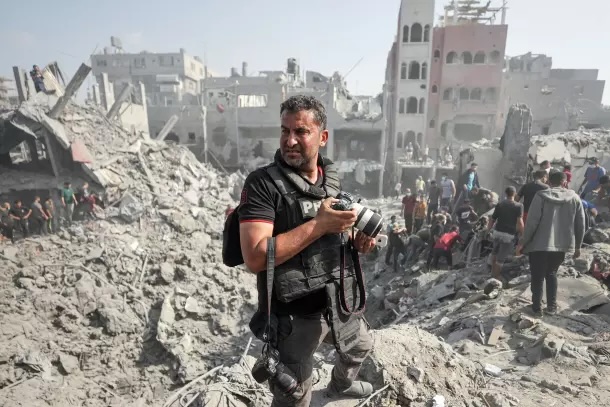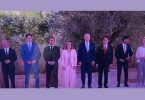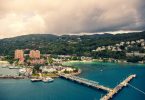IFJ, in a statement, says it condemns the killing of more than 100 journalists in the ongoing Gaza conflict and the imprisonment of journalists in many countries around the world, such as Russia.
In 2024, the UNESCO/Guillermo Cano World Press Freedom Prize, following the recommendation of an International Jury of media professionals, will be awarded at the World Press Freedom Conference in Santiago, Chile, tonight, May 2.
In these times of darkness and hopelessness, we wish to share a strong message of solidarity and recognition to those Palestinian journalists who are covering this crisis in such dramatic circumstances. As humanity, we have a huge debt to their courage and commitment to freedom of expression.
Mauricio WeibelChair of the International Jury of media professionals
UNESCO on May 2 awarded its world press freedom prize to all Palestinian journalists covering the war in Gaza, where Israel has been battling Hamas for more than six months.
IFJ says in its statement: This has been a prolonged onslaught on press freedom and the world’s ‘right to know,’ as have the arbitrary arrests and intimidation. The Federation calls on governments around the globe, and particularly the Israeli government, to protect the lives of journalists and press freedom by international obligations.
The journalists’ death toll in Gaza is without precedent. At least 109 journalists and media workers have been killed in the Gaza war since 7 October: 102 Palestinians, four Israelis, and three Lebanese, according to IFJ data. It is one of the deadliest conflicts ever for the media, and yet, there is another critical casualty: press freedom.
Since the Israeli government blocked civilian access to the Gaza Strip on 7 October, following the attack by Hamas, only Palestinian journalists based in the enclave and, to a very limited extent, international media crews embedded with the Israeli military under controlled conditions, have been able to report on the ground. The IFJ has several times called on Israel to let foreign press enter Gaza and stop hindering journalists’ work and the public’s right to freedom of expression.
“It is a matter of global public interest that not only local but also international journalists bear witness and document the ongoing war in Gaza. Prolonging the ban on entering the enclave is denying the world a true picture of events in Gaza, and it deliberately infringes freedom of the press. This is why on World Press Freedom Day, we call upon Israel to stop targeting journalists and infringing press freedom – actions that are unfitting of a democracy,” said IFJ General Secretary Anthony Bellanger.
Despite suffering terrible losses or being injured themselves, local journalists have become the world’s eyes and ears and the sole source of information from Gaza to the world.
The IFJ and its affiliate the Palestinian Journalists’ Syndicate (PJS) have worked closely to raise solidarity funds to provide emergency support to Gaza’s journalists through the IFJ Safety Fund with the outstanding solidarity of journalists’ unions.
Next, joint efforts will focus on rebuilding the media landscape in Gaza. Thanks to the support of the IFJ’s Canadian affiliate Unifor and the Norwegian Union of Journalists, solidarity newsrooms will be established in the enclave.
The PJS, which has a branch in Gaza, will clear safety concerns with the Israeli military to ensure that everyone allowed in the IFJ-PJS solidarity newsrooms is a professional journalist to avoid targeting by the IDF.
As the war drags on, more funds are needed for rebuilding Gaza’s media landscape and supporting the work of Palestinian journalists, such as the IFJ-PJS newsrooms project. All donations count and can be made here.
On World Press Freedom Day, the IFJ restates its calls for the urgent adoption of a binding international instrument that will strengthen press freedom by forcing governments to investigate and respond to attacks against the media.
IFJ president Dominique Pradalié said: “Since adopting the Windhoek Declaration in 1991, little has been done to safeguard journalists in international law or conventions better. The freedom and security journalists require to do their jobs is absent in many parts of the world. Today, Israel appears determined to silence Gaza’s journalists, including targeting them. Crimes against journalists must not go unpunished. We urge governments worldwide to publicly acknowledge their support for a binding international instrument that protects journalists. By adopting such a Convention against impunity, the United Nations General Assembly will assert unequivocally that massacres against journalists, such as the one ongoing in Gaza, will not be repeated”.
In 2024, World Press Freedom Day is dedicated to the importance of journalism and freedom of expression in the current global environmental crisis.
Awareness of all aspects of the global environmental crisis and its consequences is essential to build democratic societies. Journalistic work is indispensable for this purpose.
Journalists encounter significant challenges in seeking and disseminating information on contemporary issues, such as supply-chains problems, climate migration, extractive industries, illegal mining, pollution, poaching, animal trafficking, deforestation, or climate change. Ensuring the visibility of these issues is crucial for promoting peace and democratic values worldwide.
In the context of the world’s triple planetary crisis —climate change, biodiversity loss, and air pollution— dis- /misinformation campaigns challenge knowledge and scientific research methods. Attacks on the validity of science pose a serious threat to pluralistic and informed public debate. Indeed, misleading and false information about climate change can, in some cases, undermine international efforts to address them.
Dis-/misinformation about environmental issues can lead to a lack of public and political support for climate action, effective policies, and the protection of vulnerable communities affected by climate change and women and girls, as climate change tends to exacerbate existing inequalities.
To achieve sustainable development, journalists must accurately, timely, and comprehensively report on environmental issues and their consequences, as well as possible solutions.
This requires a comprehensive strategy that includes:
- Preventing and protecting against crimes committed against journalists.
- Ensuring the rights to freedom of expression, freedom of scientific research, and access to key sources of information, in addition to combating dis-/misinformation through journalism.
- Promoting the plurality, diversity, and viability of media, especially regional, local, indigenous, and community-based media.
- Ensuring that the governance of digital platforms foster the transparency of technology companies, their accountability, due diligence, user empowerment, and content moderation and curation based on international human rights’ standards, as indicated in UNESCO’s Guidelines for the Governance of Digital Platforms.
- Promoting Media and Information Literacy programs to empower users with skills to engage and think critically in the digital environment.
Origins and purpose of World Press Freedom Day
World Press Freedom Day was proclaimed by the UN General Assembly in December 1993, following the recommendation of UNESCO’s General Conference. Since then, 3 May, the anniversary of the Declaration of Windhoek is celebrated worldwide as World Press Freedom Day.
After 30 years, the historic connection made between the freedom to seek, impart and receive information and the public good remains as relevant as it was at the time of its signing. Special commemorations of the 30th anniversary are planned during World Press Freedom Day International Conference.
May 3 acts as a reminder to governments of the need to respect their commitment to press freedom. It is also a day of reflection among media professionals about issues of press freedom and professional ethics. It is an opportunity to:
- celebrate the fundamental principles of press freedom;
- assess the state of press freedom throughout the world;
- defend the media from attacks on their independence;
- and pay tribute to journalists who have lost their lives in the line of duty.
Volker Turk, UN Human Rights on 2023 statistics
When I think of journalism’s values, I think of trust, truth, and integrity. I think of the countless, fearless individuals daring to question.
Daring to challenge power, risking their lives to document atrocities, corruption, and crime, and to stand up against oppression. 2023 marked one more devastating year for journalism.
It was a year characterized – again – by impunity. Only 13% of the murder cases have been investigated.
And 320 journalists and media workers were imprisoned, the highest number ever. When we lose a journalist, we lose our eyes and ears to the outside world. We lose a voice for the voiceless. We lose, in fact, a human rights defender.
World Press Freedom Day was established to celebrate the value of truth and to protect the people who work courageously to uncover it. We are marking it this year in an era of acute global turmoil and the profound fragmentation and polarisation of humanity.
Conflict is boiling over in many places – from Myanmar to Sudan, Ukraine, Gaza, and several other parts of the world – causing intolerable human suffering.
Disinformation is infecting our media and digital landscapes, fuelling hate and division. And as climate change batters our fragile planet, the lives and livelihoods of future generations are under the gravest threat this world has ever known. This year, World Press Freedom Day centers on journalism in the face of the environmental crisis.
I honor the journalists worldwide working to hold polluters accountable for the damage and the devastation. They are driving open debate and critical thinking.
By separating facts from lies and propaganda, they are advocating for evidence-based policy decisions on the climate crisis that the world urgently needs.
Their work is fundamental to triggering change, yet it can also be dangerous. Particularly if they are perceived to hamper the economic interests of the powerful actors engaged in harmful or illegal environmental activities.
Environmental journalists need stronger commitments from their governments and their employers to protect them. Better and safer working conditions.
An expanded media space for coverage on environmental issues. And the right to work free from attacks, hate campaigns, and physical and legal harassment.
The dramatic consequences of inertia and inaction on the climate crisis are unfolding as we speak. This doesn’t have to be the case.
We need independent, ethical and quality journalism perhaps now more than ever. On the climate crisis – and on all crises – journalists serve as the ultimate allies in human rights. Because in their pursuit of facts, evidence and accountability, we have one of our best hopes to build societies based on truth and trust.
After 30 years, the historic connection between the freedom to seek, impart, and receive information and the public good remains as relevant as it was at its signing. Special commemorations of the 30th anniversary are planned to take place during the World Press Freedom Day International Conference.
May 3 acts as a reminder to governments of the need to respect their commitment to press freedom. It is also a day of reflection among media professionals about press freedom and professional ethics. It is an opportunity to:
- celebrate the fundamental principles of press freedom;
- assess the state of press freedom throughout the world;
- defend the media from attacks on their independence;
- and pay tribute to journalists who have lost their lives in the line of duty.
IMTIAZ MUQBIL, Bangkok, Thailand:
Travel Impact publisher and veteran journalist Imtiaz Muqbil said:
“Today is World Press Freedom Day. Unfortunately, there is not much freedom for us journos these days. Anyhow, here’s a tribute to just a few of the great travel publications from the 1980s and 1990s, when the atmosphere was a lot more vibrant and democratic. Today, it’s all about “influencers and content creators.”






(eTN): The World Press Freedom Prize Honors Killed Palestinian Journalists | re-post license | post content























